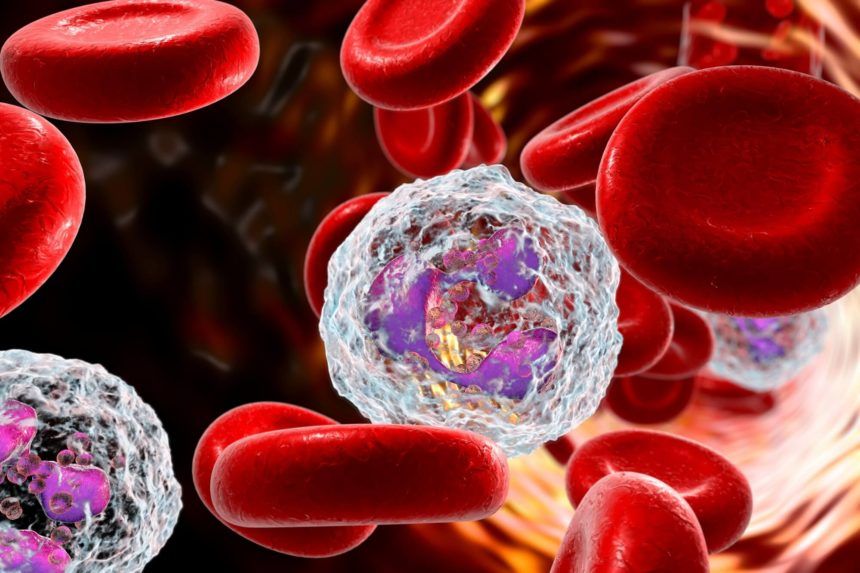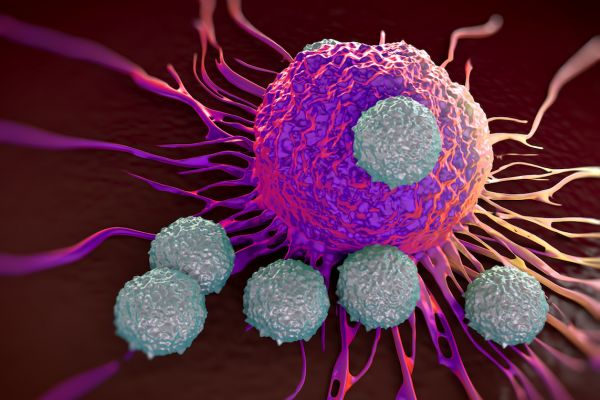White blood cells play an important role in your immune system, fighting infection and removing foreign agents and abnormal cells. The majority of white blood cells are neutrophils. (See box below.) Neutrophils live for only 7-12 hours. Your bone marrow must continually make more to replace the older neutrophils that have died.
Neutrophils are first on the scene. They destroy infectious agents and harmful substances by surrounding and engulfing them. (This is called phagocytosis.)
Neutrophils are the “first responders” of your immune system when you are injured or when bacteria, viruses or other foreign substance invade your body. When your neutrophil count drops below a certain level, you are considered to have neutropenia or to be neutropenic, which means you are at higher risk for infections. If your neutrophil count is just a bit below the normal range, the neutropenia is mild and the increased risk is slight. In that case, you may need to take normal precautions, such as avoiding anyone who is ill. If your neutrophil count drops far below normal, your risk of getting an infection is greatly increased and you must take extra precautions. Talk to your doctor about your risk of infection and the specific precautions you need to follow.
What Affects Your Risk Level?
- The type of cancer you have (Some cancers cause neutropenia.)
- The kind of cancer treatment(s) you are receiving (Some treatments cause neutropenia.)
- Any other medical problems you may have
- How low your neutrophil count has fallen (severity)
- How long you have had neutropenia
Your doctor considers many factors when deciding whether neutropenic precautions are needed and how strict those precautions should be. Check with your doctor before you:
- Use aspirin, acetaminophen or any other medicine to reduce a fever
- Receive any vaccines
- Use herbal or other naturopathic/complementary medicines or products
Here are some general tips on how to reduce the risk of infection. If your treatment may affect your white blood cell count, these guidelines can help protect you until your own immune system can go back to doing its job.
Taking Care of Yourself
- Washing your hands with soap is the single most important action you can take to prevent infection. Lather your hands for at least 20 seconds before rinsing. Wash your hands often, especially before and after eating, and after using the restroom. If soap and water are not available, hand sanitizer can be used, unless your hands are very dirty.
- Protect your hands. Wear rubber gloves when doing dishes, oven mitts when cooking/baking, and protective gloves in any situation where you may be scratched or cut.
- Brush your teeth gently, three to four times a day. Use a soft toothbrush; you can make it softer by running it under warm water first. Use an alcohol-free, peroxide-free, antiseptic mouthwash such as Biotene® every day.
- Skin: Shower or bathe daily and gently pat your skin dry. Use a sunscreen with an SPF of 30 or higher and don’t get a sunburn. Avoid dry skin: Use moisturizer, lip balm, etc. Don’t chew, cut or pick at the cuticles around your nails.
- Try to do some low-impact exercise, such as walking, every day. Avoid activities that may cause injury, such as biking and skating.
- Wear shoes when you go outside, and shoes or slippers when indoors, to prevent cuts on your feet. Take care to avoid cuts or nicks when handling anything sharp.
- Avoid areas with a lot of dust or mold, such as construction sites and damp basements.
- Don’t share utensils, glasses or towels.
- Stay away from people who are sick.
- Drink plenty of fluids, keep moving and consider using a stool softener to help prevent straining and constipation.
- Practice food safety: Wash fresh fruits and vegetables, and do not eat raw or undercooked meat, eggs or fish.
Never miss another Cancer Talk blog!
Sign up to receive our monthly Cancer Talk e-newsletter.
Sign up!Medications
People on treatments that are known to cause significant neutropenia may be prescribed a Colony-Stimulating Factor (CSF) medication, such as filgrastim/Neupogen® or pegfilgrastim/Neulasta®. This injection can shorten the time that you have neutropenia. Many people now leave the infusion center wearing an on-body injector that dispenses the right dose of medication at the right time. Using the on-body injector means you do not have to make another visit just to get an injection. Your doctor may also prescribe antibiotics to prevent infections.
When to Call
Remember that the more severe the neutropenia, the more likely it is that you won’t show the normal, expected symptoms of infection. Sometimes a fever is the only sign. Call your doctor right away if you have a fever of 100.4°F (38°C) or higher, shaking chills or sweats. Common sites of infection are lungs (pneumonia), urinary tract, skin and mucous membranes, and the digestive tract (mouth, stomach, intestines). If your white blood cell count is very low, or your doctor tells you that you have severe neutropenia, take your temperature four times a day.
Types of White Blood Cells (WBCs)
| Granulocytes | |
|---|---|
| Neutrophils | Neutrophils make up 55-70% of your white blood cells. They are the first immune system cells on the scene when you are injured or when bacteria, viruses or other foreign substances invade the body. |
| Basophils | Basophils go into action right away when foreign agents enter the body. Basophils contain histamine, which dilates local vessels and allows more blood into the area, bringing additional white blood cells. |
| Eosinophils | Your eosinophil count rises in response to a parasitic infection and during inflammatory responses, such as an allergic reaction. |
| Lymphocytes | |
|---|---|
| B cells | B cells make antibodies (proteins that attack specific antigens, such as bacteria, viruses and other foreign agents). The antibodies help you fight the infection and may provide immunity from reinfection in the future. |
| T cells (T lymphocytes) | T cells help regulate how other immune cells work and attack certain infected cells and abnormal (tumor) cells. |
| Natural killer (NK) cells | NK cells attack viruses and cells that have become cancerous. |
| Monocytes | |
|---|---|
| Monocytes | Monocytes travel from the bone marrow into your tissues and become macrophages when they arrive. Macrophages use phagocytosis; they surround and engulf dead cells and large foreign particles. |


